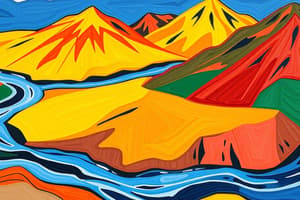Podcast
Questions and Answers
What is the term for the place where a river originates?
What is the term for the place where a river originates?
Source
What do you call the area drained by a river and its tributaries?
What do you call the area drained by a river and its tributaries?
River basin
What process involves the removal of broken rock materials from their original place and deposition elsewhere?
What process involves the removal of broken rock materials from their original place and deposition elsewhere?
Erosion
What are the main agents of erosion mentioned in the text?
What are the main agents of erosion mentioned in the text?
How many ways do exogenic forces carry out their work according to the text?
How many ways do exogenic forces carry out their work according to the text?
What is the term for the place where a river joins another water body?
What is the term for the place where a river joins another water body?
What is the term for the process by which running water carries out erosion?
What is the term for the process by which running water carries out erosion?
What is the process that involves the disintegration and decomposition of rocks?
What is the process that involves the disintegration and decomposition of rocks?
What is the term for the combination of small streams to form a river?
What is the term for the combination of small streams to form a river?
Flashcards are hidden until you start studying
Study Notes
Landform Formation
- Landforms on the Earth's surface are formed by endogenic and exogenic forces.
- Exogenic forces, such as weathering and erosion, reduce the elevation of existing landforms.
Rivers
- A river forms when many small streams join together.
- The source of a river is the place where it originates.
- A river flows downhill in a valley and eventually falls into a larger water body, such as a sea, ocean, or lake.
- The place where a river joins another water body is called the mouth.
Weathering
- Weathering is the disintegration and decomposition of rocks.
- Factors that contribute to weathering include heat, cold, frost action, plants, animals, and chemical reactions.
- Weathering does not involve the movement of broken rock materials.
Erosion
- Erosion is the removal of broken rock materials from their place of origin and depositing them elsewhere.
- Running water, sea waves, moving ice (glaciers), and wind are the main agents of erosion.
- A river's running water carries out erosion in three ways:
- It erodes rocks over which it flows.
- It transports eroded materials.
- It deposits transported materials in different places.
Studying That Suits You
Use AI to generate personalized quizzes and flashcards to suit your learning preferences.




